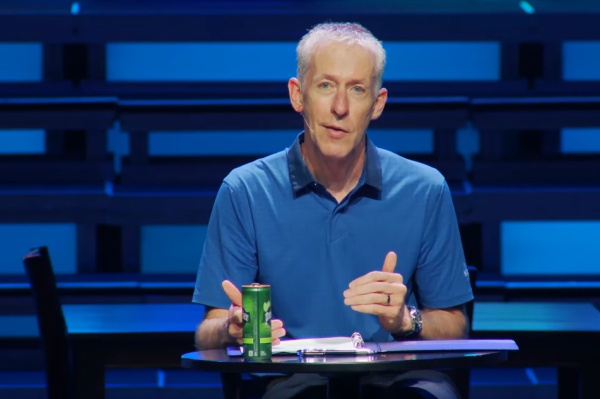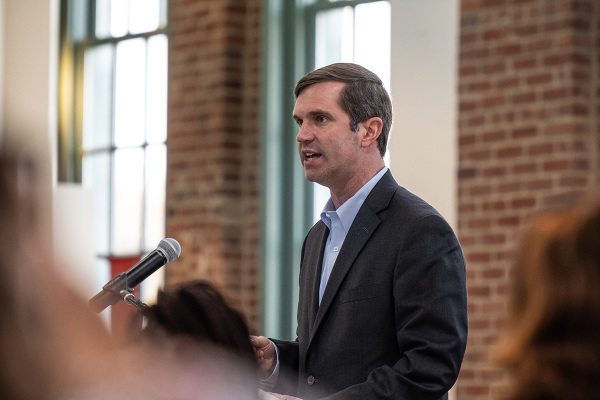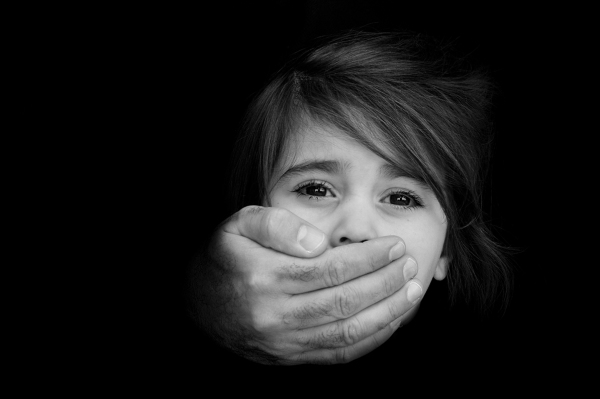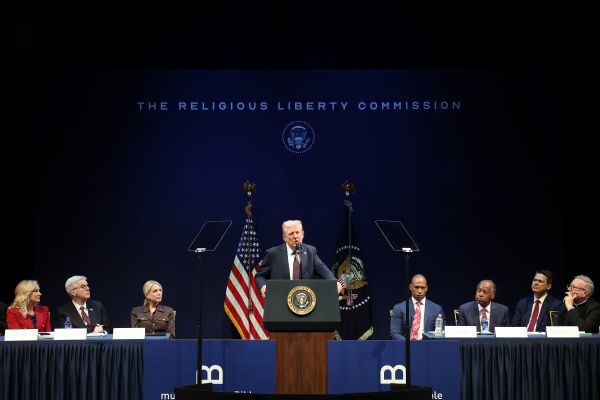Christian group holds Good Friday service on Capitol grounds amid free speech legal battles
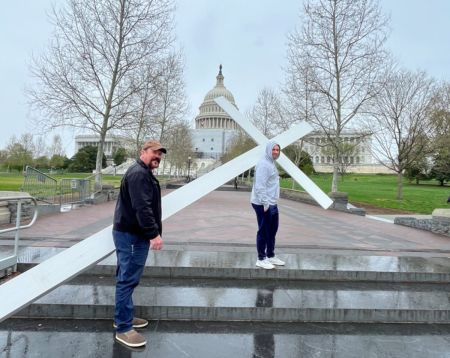
After a legal battle spanning nearly two years, a Christian group held a large Good Friday service at the United States Capitol to “celebrate the redemptive and healing power of the cross.”
The Rev. Patrick Mahoney, the leader of the Christian Defense Coalition, announced in a statement on Twitter Thursday that “after fighting for two years, we will be allowed to have our Good Friday service at the U.S. Capitol.”
“We were prohibited from having it there, we filed several lawsuits and now we are delighted to report that we will be having our prayer and worship time as we celebrate the redemptive and healing power of the cross,” he explained in a video accompanying the announcement.
After fighting for 2 years, we will be allowed to have our Good Friday service at the U.S. Capitol.
— Rev. Patrick Mahoney (@revmahoney) April 6, 2023
Please join us on the lower western terrace of the Capitol on Friday, April 7, at 12:00 PM. #GoodFriday#ThankfulForTheCross#ReligiousFreedom#HolyWeekpic.twitter.com/Bipbq9vwlx
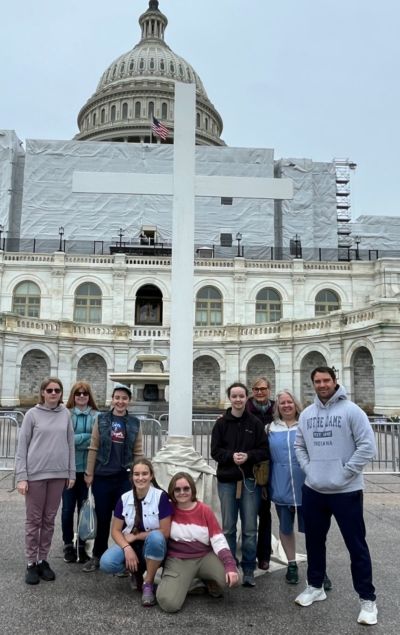
The Good Friday service took place three days after a federal judge ruled in favor of the Christian Defense Coalition in its third lawsuit against the U.S. Capitol Police Board and its individual members over the defendants’ refusal to allow the group to hold large gatherings on Capitol grounds.
In a statement following Tuesday’s decision, Mahoney proclaimed that “The Christian Defense Coalition is thankful religious freedom and the First Amendment are once again being celebrated and honored on the grounds of the United States Capitol this Good Friday.”
Mahoney added, “Our efforts to open the Capitol back up to ‘the people,’ is a powerful reminder that all Americans must continually be vigilant in ensuring our rights are protected.”
“Good Friday reminds us of God’s extraordinary love and mercy for all of humanity as Christ experienced untold suffering to bring us into a personal relationship with God,” he continued. “In a highly partisan and divided city and nation, the cross of Christ towers over America as a bright beacon of hope and healing.”
A picture posted on Mahoney’s Twitter account Friday showed a 15-foot cross on its way to the U.S. Capitol, accompanied by the hashtag #CherishtheCross.
Video footage from the event shows one participant singing “In Christ Alone.” Mahoney told CP that attendees at the service included Mark Lee Dickson, the founder of Sanctuary Cities for the Unborn movement that involves drafting and working to pass ordinances banning abortion at the local level.
Ready to go for our Good Friday Service at the US Capitol! Here’s the truck taking our 15ft cross to Washington, DC! #GoodFriday#HolyWeek#CherishTheCrosspic.twitter.com/YwWPaNxxEn
— Rev. Patrick Mahoney (@revmahoney) April 7, 2023
Katie singing, “In Christ Alone,” at our Good Friday service at the US Capitol today. A powerful reminder of God’s extraordinary, love for humanity. #GoodFriday#HolyWeek#ChristAlone#Hope#Healingpic.twitter.com/y9ZKm6hf30
— Rev. Patrick Mahoney (@revmahoney) April 7, 2023
Ready to go for our Good Friday Service at the US Capitol! Here’s the truck taking our 15ft cross to Washington, DC! #GoodFriday#HolyWeek#CherishTheCrosspic.twitter.com/YwWPaNxxEn
— Rev. Patrick Mahoney (@revmahoney) April 7, 2023
While the opinion filed by Chief Judge James Boasberg of the United States District Court for the District of Columbia provided good news to Mahoney by allowing his third lawsuit to move forward, it indicated that “his application for a permit for his Good Friday vigil was recently granted,” meaning that Tuesday’s ruling was not the reason he is able to hold the event.
The opinion stated: “After the January 6, 2021, assault on the Capitol, Defendant U.S. Capitol Police Board imposed heightened restrictions upon entry on to the Capitol Grounds, many of which persist today.” It identified such limits as “crowd-size caps in certain areas to blanket prohibitions on demonstrations in others.”
As stated in the ruling, Mahoney, “a clergyman who would like to hold large group vigils on the Capitol grounds for a range of occasions, brought this suit challenging those limitations and the Board’s practices as unconstitutional.”
The Presbyterian minister had previously attempted to hold a vigil on the 20th anniversary of the Sept. 11, 2001, terror attacks but was initially informed that he could not do so.
Mahoney contended that the defendant engaged in selective approval of permits on certain parts of Capitol grounds, as it had previously approved three permits for events that were “sponsored, organized or advocated for by a member of Congress (or their staff).” This prompted him to file a lawsuit.
Shortly after the lawsuit was filed, the Capitol Police Board opened up certain parts of the Capitol grounds to groups of fewer than 20. He ended up holding a Sept. 11 vigil with just his wife. Two months later, he filed an amended complaint alleging violations of “his First Amendment rights to freedom of speech, freedom of association and assembly, and free exercise of religion; his Fifth Amendment right to due process; his Fifth and Fourteenth Amendment rights to equal protection, and the Religious Freedom Restoration Act.”
Mahoney filed to hold a Good Friday service on the Capitol grounds last year but was only allowed to hold one with three people. Shortly thereafter, much larger protests took place at areas where groups of larger than 20 were not allowed to congregate, with Mahoney concluding that those events could take place because they were “sponsored, organized, or advocated for by a member of Congress (or their staff).”
Even after the larger protests took place, the Capitol Police Board denied Mahoney’s requests to hold events drawing a similar crowd size. After filing a second amended complaint, the Capitol Board granted his request to hold a vigil on the 21st anniversary of the 9/11 attacks but denied him a permit to conduct a vigil ahead of the 2022 midterm elections.
The most recent lawsuit, at issue in Boasberg’s opinion, stems from his efforts to hold a series of vigils on Capitol grounds in 2023, including the Good Friday service. While he is able to hold the Good Friday service, he wants to hold an additional 5,000-person demonstration on the first anniversary of the Dobbs v. Jackson Women’s Health Organization decision that declared that the U.S. Constitution does not contain a right to abortion in an area where such events are currently limited to 250 people.
Mahoney is seeking a ruling declaring that the restrictions on events at the U.S. Capitol are unconstitutional as well as an “injunction barring the Board from enforcing any of those practices and its Regulations and directing it to permit him to conduct his proposed vigils and demonstration activity.” Boasberg’s decision will enable his litigation to move forward.
Ryan Foley is a reporter for The Christian Post. He can be reached at: ryan.foley@christianpost.com










